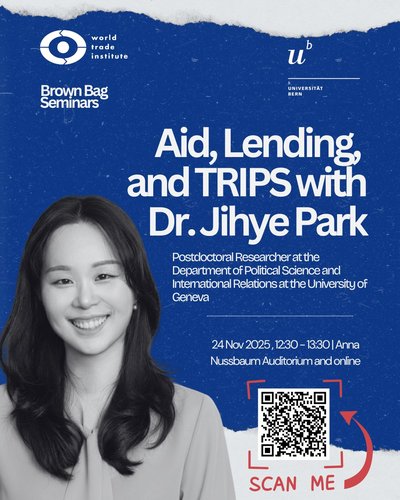Brown Bag Seminar
4 Nov 2025
,
12:30
-
13:30
| Download
Calendar Event (ICS)
Silva Casa Auditorium, World Trade Institute, University of Bern,
Hallerstrasse 6, Bern, Switzerland
Aid, Lending, and TRIPS
Rise of superstar firms marked the new era of the international intellectual property (IP) rights protection regime guided by the WTO Agreement on Trade-Related Aspects of Intellectual Property Rights (TRIPS). Despite the opposed views from developing nations on TRIPS, particularly in terms of stringent IP rights protection standards that the agreement puts forward, the United States has succeeded in extending the TRIPS regime by embedding TRIPS-plus provisions in their preferential trade agreement negotiations, with other advanced industrialized nations following suit. This study attributes the success the United States has had in the proliferation of the TRIPS regime to its development finance allocation strategy vis-à-vis developing countries. I utilize the National Trade Estimate (NTE) reports spanning from 1995 to 2022 published annually by the United States Office of Trade Representative (USTR) to create a semantic proxy for the US assessment of IP rights protection in its trade partners, harnessing cutting-edge large language model DeBERTa-v3. The analyses employing the proxy show that (1) IP-relevant lobbying by US corporate elites drives the US evaluation of current IP regimes in their investment destinations, (2) developing countries faced with significant concerns from US firms about their IP environment are more likely to be compensated by the United States when signing TRIPS-plus trade agreements, with the forms of compensation varying by their regime type. Democracies tend to receive increased foreign aid, whereas autocracies are more likely to benefit from International Finance Corporation (IFC) lending to their private sectors. The findings resonate with the supply-side view of strategic aid, where congressional support facilitates aid rewards to democracies than to autocracies, and offer a nuanced perspective of understanding US strategic influence in multilateral lending as a complementarity to foreign aid allocation, less bounded by domestic political considerations in selecting targets.
About speaker
Jihye Park is a Postdoctoral Researcher at the Department of Political Science and International Relations at the University of Geneva. Her research spans various topics in International Political Economy, including politics of trade, development finance, and firm-level preferences. She is currently working on an FNS project led by Professor Simone Dietrich, "Politics and Performance of National Development Finance Institutions". Methodologically, she uses large language models (LLMs) and causal inference models to generate new measures of political interests and explore firm-government dynamic in global trade regime. She is contributing two forthcoming chapters on panel analysis and text analysis to the Encyclopedia of Measurement in Social Sciences, 2nd ed. (Elsevier), reflecting her strong quantitative background.
Jihye holds a PhD in Political Science from University of Rochester, where she also held a 2024-25 Skalny Predoctoral Fellowship.


